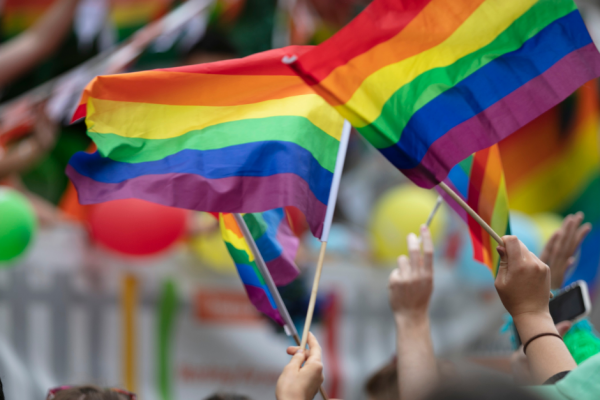Houston boasts a vibrant LGBTQ+ community, but finding the right mental health support can still be a challenge. All individuals deserve to find a therapist who is knowledgeable and understanding of their unique needs. In this guide, we will provide you with valuable tips and resources to navigate the process of finding the right therapist who respects your sexual orientation, gender identity, and expression. Whether you identify as lesbian, gay, bisexual, transgender, queer, or any other part of the diverse LGBTQ+ community, it’s crucial to have a therapist who creates a supportive environment for you to explore and address your mental health concerns. That’s why we have created the ultimate guide to help you find LGBTQ-friendly counselors in Houston or anywhere in the US.
We understand that finding the right counselor can be challenging. Our hope in sharing these tips with you is to empower you not to let your sexual orientation, gender identity, and fear of being understood hinder your therapy journey. There are professionals out there who are ready to welcome you in and accept you exactly as you are.
Houston’s LGBTQ+ community deserves mental health care that truly understands their experiences. Read on to discover how you can find an LGBTQ-friendly counselor who will provide you with the care and understanding you deserve.
Table of Contents

Understanding the Importance of LGBTQ-Friendly Counselors
LGBTQ+ individuals often face unique mental health challenges that are deeply rooted in societal stigma, discrimination, and lack of acceptance. These struggles are often compounded by some intersecting identity for folks from marginalized communities. From navigating the complexities of coming out to dealing with the impact of minority stress, LGBTQ+ people require counselors who are knowledgeable, sensitive, and affirmative of their identities.
Seeking therapy from LGBTQ-friendly and affirming counselors is crucial because they possess a deep understanding of the lived experiences and specific needs of the LGBTQ+ community. These professionals are trained to create a safe and inclusive environment where clients can openly discuss their concerns without fear of judgment or misunderstanding. They are equipped to provide tailored support, use appropriate terminology, and address issues such as gender identity, sexual orientation, relationships, and the impact of homophobia and transphobia.
By working with an LGBTQ-friendly counselor, individuals can feel empowered to explore their identity, navigate personal and social challenges, and improve their overall mental well-being. These counselors are committed to fostering a therapeutic relationship built on trust, respect, and acceptance. It is essential for the LGBTQ+ community to feel heard, validated, and supported on their journey toward self-acceptance and growth.
Challenges Faced by LGBTQ Individuals in Therapy
LGBTQ+ individuals often face significant barriers when seeking traditional mental health services, which can deter them from accessing the care they need. One of the primary challenges is the lack of LGBTQ-affirming and knowledgeable counselors, leading to experiences of discrimination, invalidation, and even further marginalization within the therapy setting.
Many LGBTQ+ people have reported encountering therapists who are uninformed about LGBTQ+ identities, use outdated or offensive terminology, or hold biases and misconceptions about the LGBTQ+ community. This can create an environment of discomfort, mistrust, and even re-traumatization, where clients feel compelled to educate their therapist or censor their own experiences.
Additionally, LGBTQ+ individuals may face challenges in finding counselors who understand the unique intersection of their identity with other aspects of their lived experience, such as race, ethnicity, socioeconomic status, or disability. This intersectionality can further complicate the therapy process and hinder the development of a strong therapeutic alliance.
It is deeply unfortunate that this has been the experience of so many LGBTQ+ folks. The fear of encountering such negative experiences can prevent LGBTQ+ individuals from seeking therapy altogether, leading to unmet mental health needs and the perpetuation of mental health disparities within the community. Addressing these barriers and ensuring access to LGBTQ-friendly counselors is crucial for promoting the well-being and empowerment of LGBTQ+ individuals.
Benefits of Seeking Therapy From LGBTQ-Friendly Counselors
Seeking therapy from LGBTQ-friendly counselors can provide numerous benefits for individuals within the LGBTQ+ community. These counselors are specifically trained to create a safe, inclusive, and affirming environment where clients can explore their identity, address their mental health concerns, and develop effective coping strategies.
One of the primary benefits is the ability to feel understood and validated. There is so much power in being in a space where you can feel free and encouraged to be unapologetically yourself. For some individuals, it is likely that the therapeutic setting is the first space that they have had to be themselves. LGBTQ-friendly counselors possess a deep understanding of the unique challenges and experiences faced by the LGBTQ+ community, including the impact of societal stigma, discrimination, and minority stress. This knowledge allows them to provide empathetic and culturally competent support, fostering a sense of trust and safety that is essential for the therapeutic process.
Additionally, LGBTQ-friendly counselors are equipped to address issues specific to the LGBTQ+ community, such as coming out, navigating relationships, gender affirmation, and the impact of intersecting identities. By addressing these concerns through an LGBTQ-affirming lens, clients can develop a stronger sense of self-acceptance, resilience, and overall well-being.
Furthermore, working with an LGBTQ-friendly counselor can help individuals overcome internalized homophobia or transphobia, which can have a profound impact on their mental health and self-esteem. These counselors are trained to challenge harmful societal narratives and provide a space for clients to explore and embrace their identity without judgment or fear of rejection.
Do You Live in Texas? Find an LGBTQ-Friendly Counselor Near You
Living in Texas and trying to find an LGBTQ-friendly counselor can feel like a daunting task, but there are several resources and strategies available to help you locate the right mental health professional for your needs.
One of the most effective ways to start your search is by utilizing online directories and databases that connect LGBTQ+ individuals with affirming and knowledgeable counselors. These platforms, such as the LGBTQ Psychotherapists Directory, the American Psychological Association’s Psychologist Locator, and the GLBT Near Me directory, allow you to search for counselors based on location, specialty, and LGBTQ-affirmative credentials.
Another valuable resource is to reach out to LGBTQ+ community organizations, support groups, or advocacy centers in your area. These groups often maintain referral lists or recommendations for LGBTQ-friendly mental health professionals who have been vetted and endorsed by the community. They may also be able to provide insights into the counselor’s approach, experience, and reputation within the LGBTQ+ community.
Additionally, consider reaching out to your insurance provider or local mental health clinics to inquire about LGBTQ-affirming counselors within their network. Many healthcare organizations are working to improve their LGBTQ-inclusive practices and can direct you to counselors who have received specialized training in LGBTQ+ mental health.
Lastly, when researching individual counselors, it’s important to scan through their website and/or bio and look for keywords indicating that they are LGBTQ+ affirming. Usually, a therapist who is passionate about supporting marginalized communities will explicitly indicate this on their website.
Researching and selecting LGBTQ+ friendly counselors in Houston.
Once you have identified a few potential LGBTQ-friendly counselors, it’s important to thoroughly research and evaluate their qualifications, experience, and approach to ensure they are the right fit for your needs.
Review the counselor’s online presence, including their professional website, social media profiles, and any published articles or resources they have created. Look for clear indications of their LGBTQ-affirmative values, such as the use of inclusive language, the display of LGBTQ-affirming symbols or imagery, and the inclusion of LGBTQ-specific services or specialties.
It’s also beneficial to read any client testimonials or reviews that may be available, as they can provide valuable insights into the counselor’s bedside manner, communication style, and ability to create a safe and supportive environment. Pay attention to whether the reviews mention the counselor’s sensitivity, understanding, and respect for the client’s LGBTQ+ identity.
When reaching out to potential counselors, be prepared to ask questions that will help you assess their level of LGBTQ competency and their approach to working with LGBTQ+ clients. Some key questions to consider include:
-
- What training or experience do you have in working with the LGBTQ+ community?
- How do you create a safe and inclusive environment for LGBTQ+ clients?
Can you share your understanding of the unique challenges and needs of the LGBTQ+ community? - What therapeutic techniques or approaches do you utilize to support LGBTQ+ clients?
- Can you provide examples of how you have addressed LGBTQ+-specific concerns in the past?
By thoroughly researching and evaluating potential LGBTQ-friendly counselors, you can increase the likelihood of finding a mental health professional who is the right fit for your individual needs and identity.
Other questions to ask when contacting potential counselors
When reaching out to potential LGBTQ-friendly counselors, it’s important to ask questions that will help you assess their level of competency, experience, and approach to working with the LGBTQ+ community. Here are some key questions to consider:
-
- What specific training or experience do you have in working with the LGBTQ+ community? This question helps you understand the counselor’s level of expertise and their understanding of the unique challenges faced by LGBTQ+ individuals.
- How do you create a safe and inclusive environment for LGBTQ+ clients? This question allows you to gauge the counselor’s commitment to creating a welcoming and affirming therapeutic space.
- Can you share your understanding of the unique challenges and needs of the LGBTQ+ community? This question helps you assess the counselor’s knowledge and sensitivity towards the specific concerns of LGBTQ+ individuals.
- What therapeutic techniques or approaches do you utilize to support LGBTQ+ clients? This question gives you insight into the counselor’s specific methods and strategies for addressing LGBTQ+-related issues.
- Can you provide examples of how you have addressed LGBTQ+-specific concerns in the past? This question allows you to gauge the counselor’s practical experience in working with LGBTQ+ clients and their ability to apply their knowledge effectively.
- Do you have any experience working with clients who are at the intersection of multiple marginalized identities (e.g., LGBTQ+ individuals of color, LGBTQ+ individuals with disabilities)? This question helps you understand the counselor’s awareness and sensitivity toward the intersectionality of LGBTQ+ identities.
- How do you stay up-to-date with the evolving needs and experiences of the LGBTQ+ community? This question assesses the counselor’s commitment to continuous learning and their ability to adapt their approach as the LGBTQ+ community’s needs change over time.
Many therapists provide potential clients with an opportunity to meet for a quick consultation call before scheduling an intake. This is a perfect opportunity to ask these questions and get a feel of your potential therapist! By asking these questions, you can gain a better understanding of the counselor’s competence, approach, and commitment to providing affirming and supportive care for LGBTQ+ individuals.
LGBTQ-friendly therapy techniques and approaches
LGBTQ-friendly counselors employ a variety of therapeutic techniques and approaches that are specifically tailored to the unique needs and experiences of the LGBTQ+ community. These methods aim to create a safe, inclusive, and affirming environment where clients can explore their identity, address their mental health concerns, and develop effective coping strategies.
One of the key therapeutic approaches used by LGBTQ-friendly counselors is affirmative therapy. This approach acknowledges and validates the client’s LGBTQ+ identity while also addressing the impact of societal stigma, discrimination, and minority stress. Affirmative therapy encourages self-acceptance, promotes the exploration of identity, and helps clients navigate the complexities of coming out, relationships, and gender expression.
Another common technique employed by LGBTQ-friendly counselors is intersectional counseling. This approach recognizes the intersectionality of LGBTQ+ identities with other aspects of a client’s lived experience, such as race, ethnicity, socioeconomic status, or disability. By addressing these intersections, LGBTQ-friendly counselors can provide holistic and culturally competent support that addresses the unique challenges faced by marginalized LGBTQ+ individuals.
LGBTQ-friendly counselors may also incorporate trauma-informed care into their practice, acknowledging the potential for LGBTQ+ individuals to have experienced trauma related to discrimination, rejection, or violence. This approach emphasizes safety, trust, and empowerment, helping clients heal from past traumas and develop resilience.
Additionally, LGBTQ-friendly counselors may utilize creative and expressive therapies, such as art therapy, music therapy, or narrative therapy, to provide clients with alternative means of self-expression and exploration. These modalities can be particularly beneficial for LGBTQ+ individuals who may find traditional talk therapy challenging or limiting.

Creating a safe and inclusive therapy experience
Establishing a safe and inclusive therapy experience is crucial for LGBTQ+ individuals to feel comfortable, empowered, and able to engage in the therapeutic process effectively. LGBTQ-friendly counselors are dedicated to creating an environment that is welcoming, affirming, and free from judgment or discrimination.
One key way LGBTQ-friendly counselors foster a safe and inclusive space is through the use of inclusive and affirming language. They are trained to use the client’s preferred name and pronouns, avoid making assumptions about their identity or relationships, and employ terminology that is respectful and sensitive to the LGBTQ+ community.
Additionally, LGBTQ-friendly counselors actively work to create an office or virtual therapy space that visually represents and celebrates LGBTQ+ identities. This may include the display of LGBTQ-affirming symbols, artwork, or literature, as well as the inclusion of diverse representation in any promotional materials or client resources.
These counselors also prioritize the development of a strong therapeutic alliance, built on trust, respect, and mutual understanding. They are committed to actively listening to their clients, validating their experiences, and providing a non-judgmental space for open and honest communication. This collaborative approach empowers LGBTQ+ individuals to feel heard, understood, and supported throughout the therapeutic journey.
Furthermore, LGBTQ-friendly counselors often collaborate with other LGBTQ-affirming mental health professionals, community organizations, and support networks to ensure their clients have access to a comprehensive network of resources and services. This holistic approach helps to address the diverse needs of LGBTQ+ individuals and foster a truly inclusive and supportive therapeutic experience.
Conclusion: Prioritize your Mental Health in a Safe and Affirming Space
Whether you live in Houston, Texas, or anywhere in the U.S., finding an LGBTQ-friendly counselor in Houston is an important step in ensuring that your therapy experience is safe, inclusive, healing and affirming of your identity. By understanding the importance of LGBTQ-friendly counselors, addressing the unique challenges faced by LGBTQ+ individuals in therapy, and exploring the benefits of seeking care from these professionals, you can take the first step towards a transformative and empowering mental health journey.
Through the resources and strategies outlined in this guide, you now have the tools to navigate the process of finding the right LGBTQ-friendly counselor for your needs. By researching potential counselors, asking the right questions, and evaluating their approach to creating a safe and inclusive environment, you can increase the likelihood of finding a mental health professional who is the perfect fit for you.
Remember, your mental health and well-being are of the utmost importance, and you deserve to feel heard, validated, and supported throughout the therapy process. Don’t hesitate to take the leap and reach out to LGBTQ-friendly counselors in your area – the path to self-acceptance, personal growth, and improved mental health is within your reach.
Embark on this journey with the knowledge that you are not alone, and that there are mental health professionals who are dedicated to providing you with the care, understanding, and affirmation you deserve. Take the first step towards a safe and inclusive therapy experience, and unlock the transformative power of LGBTQ-friendly counseling.

When to Seek Help
Destination Therapy provides a safe space to communicate openly and address challenges. You deserve a therapist who sees and celebrates your whole self. Start your healing journey by connecting with an LGBTQ+-affirming therapist today.
If you’re ready to explore therapy, we offer a free 15-minute consultation call to discuss your needs and see if couple therapy is right for you.


